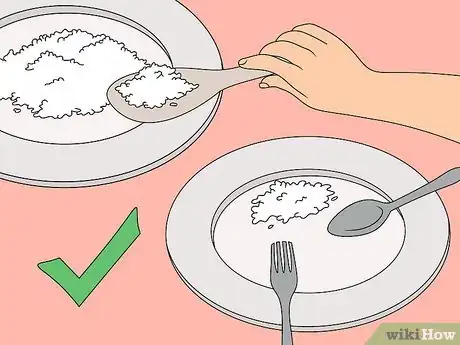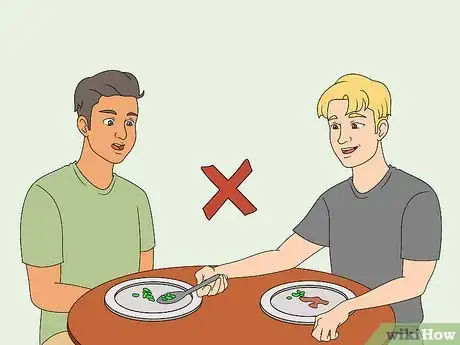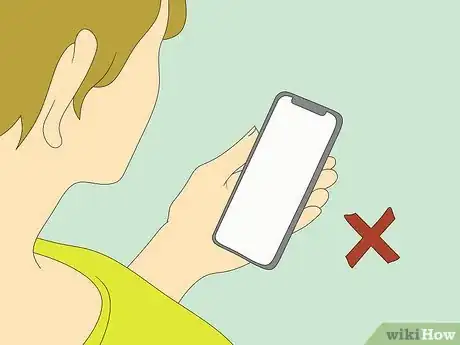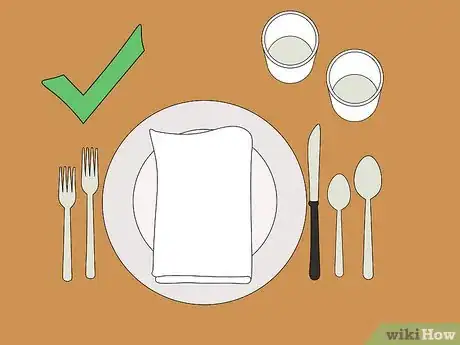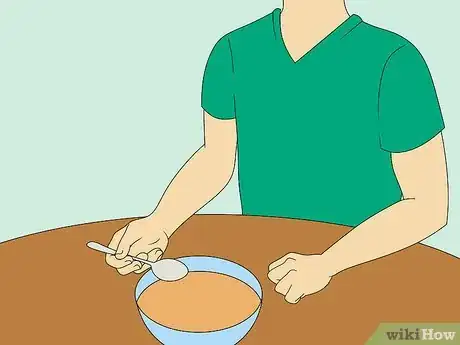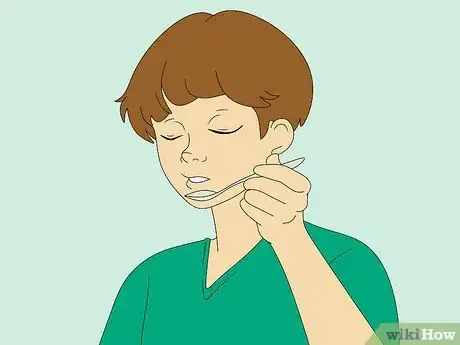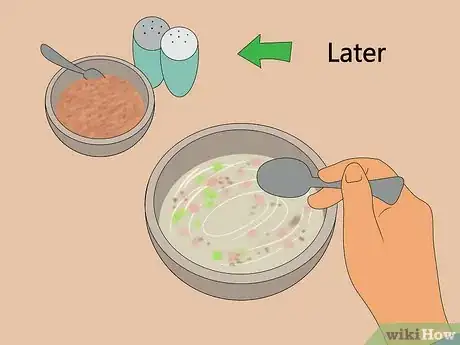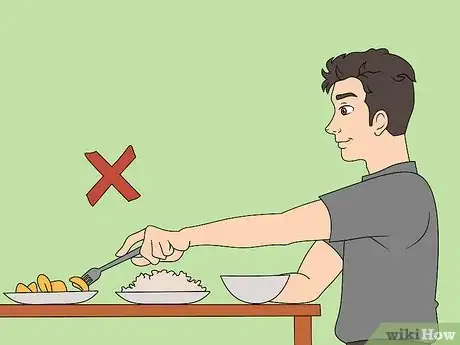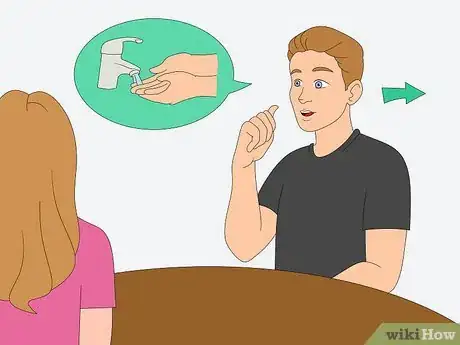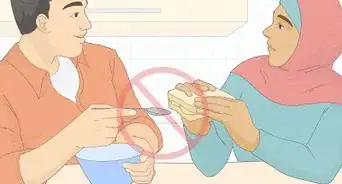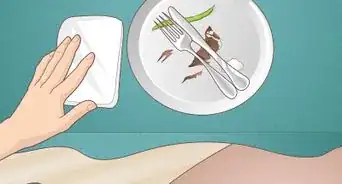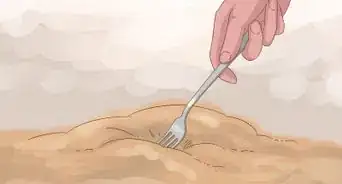This article was co-authored by Tami Claytor. Tami Claytor is an Etiquette Coach, Image Consultant, and the Owner of Always Appropriate Image and Etiquette Consulting in New York, New York. With over 20 years of experience, Tami specializes in teaching etiquette classes to individuals, students, companies, and community organizations. Tami has spent decades studying cultures through her extensive travels across five continents and has created cultural diversity workshops to promote social justice and cross-cultural awareness. She holds a BA in Economics with a concentration in International Relations from Clark University. Tami studied at the Ophelia DeVore School of Charm and the Fashion Institute of Technology, where she earned her Image Consultant Certification.
There are 7 references cited in this article, which can be found at the bottom of the page.
wikiHow marks an article as reader-approved once it receives enough positive feedback. In this case, 100% of readers who voted found the article helpful, earning it our reader-approved status.
This article has been viewed 167,243 times.
Table manners and etiquette rules change over time. Although you no longer need to follow upper class British standards of etiquette, you should demonstrate a certain level of politeness while dining with friends, family, or co-workers. Make sure to always use common table manners and be appreciative and generous towards the host. If you are dining at a fancy restaurant, make sure to follow fine dining etiquette.
Steps
Using Common Table Manners
-
1Don’t talk with your mouth full. Most people will agree that talking while chewing is the number one no-no at the dinner table. Not only is it difficult to understand what is being said, but it can also be unappetizing. If you have something to say, wait until you have swallowed your last bite before jumping into the conversation.[1]
-
2Avoid chewing loudly. It is also a good idea to keep your mouth closed while you are chewing. The sound of food smacking in your mouth can be both annoying and distracting. In fact, the term misophonia describes a revulsion to loud chewing.[2]Advertisement
-
3Use serving utensils. There are some instances when it is acceptable to eat food with your hands, such as when eating pizza. However, it is never okay to grab food from communal dishes using your fingers. Instead, you should always use the serving utensils that are provided.[3]
-
4Don’t pick food off other people’s plates. This is especially true if they have not even taken a bite yet. If you are regretting your meal choice and one of your friends has been presented with a more appealing dish, you could say, “Your pasta looks amazing!” If you are lucky, you friend will offer you a small sample.[4]
-
5Be considerate of different cultural practices. Some cultures follow different rules and table manners. For example, in some Asian cultures soup is eaten without using a spoon. Instead, the bowl is brought directly to the mouth. If you are unsure of any cultural practices, ask your host or imitate what other guests are doing.
Being a Courteous Dinner Guest
-
1Arrive on time. Your host will want to serve the dinner hot and arriving late might delay the meal. As a general rule, you should try to arrive within 15 minutes of the requested start time. Do not show up too early. Your host may still be getting ready and it is a nuisance if someone shows up ahead of schedule.[5]
- If you arrive early walk around the block a few times or read in your car until the scheduled arrival time.
- If you are going to be tardy, text or call the host in advance and tell them your estimated arrival time. If you are going to be over an hour late, tell the host to begin the evening without you and apologize.
-
2Disclose food allergies or aversions well ahead of time. If you are invited over to a friend's for dinner, you should always tell them about any food allergies or taste preferences in advance. Your friend would much rather plan their meal around your allergy, than feel guilty that you are unable to eat anything on the night of.
- For instance, if you don't eat pork for religious reasons, or any type of meat on moral grounds, your should communicate this to the host in advance.
- You could also offer to bring something along to make it easier for your friend to accommodate your dietary needs.
-
3Don’t bring a plus-one without permission. If you have been invited over to a friend’s house for dinner, never show up with an additional guest who was not invited. Instead, if you would like your new partner to accompany you to a dinner party, call the host in advance to make sure this is alright. In most cases, your friend will gladly lay out another table setting.[6]
-
4Present yourself in a clean, well-dressed manner. Your clothes should make you feel comfortable and confident. Make sure you know the atmosphere and theme in advance. For example, arriving in shorts when the other guests are wearing tuxedos and evening dresses does not make a good impression and you will likely feel uncomfortable and out of place all evening.
-
5Bring a small gift.[7] A great gift for the host can range from a bottle of wine, to a bouquet of flowers, to an edible treat, such as fresh jams or chocolates. A gift is a nice way to thank the host for having you over for dinner and signals your appreciation.[8]
- If you are invited to a casual dinner, such as a backyard barbecue or a close friend or relative's house, you could ask if there is anything you could contribute to the meal. For example, you could make a side-dish or a dessert.
- In some instances a host will inform guests not to bring any gifts; if this is the case, you should respect the wishes of the host.
-
6Ignore your phone. It is extremely rude to spend your evening texting other people or checking your social media accounts. Instead, you should engage in the conversation. By constantly checking your phone, you are signaling to the host and other guests that you are bored or would rather be somewhere else.[9]
- There are a few exceptions to this rule. If you receive an emergency call from the babysitter, for example, you can quietly duck out of the room for a few minutes to take the call.
-
7Carry on polite conversation. Talk, but try to keep your voice peaceful and polite. Talk about general topics that everyone feels comfortable engaging in.[10] Do not interrupt others. Instead, let them talk and show that you are listening by nodding along and keeping eye contact. Ask questions about the host, the food, and other guests. This is the best way to demonstrate that you are engaged and enjoying the company![11]
- Avoid sensitive topics of conversations, such as politics, religion, and sex.
- Instead, stick to relatable topics like work, kids, hobbies, or vacations.
-
8Thank your host for a lovely evening.[12] Before leaving for the evening, you should always thank your host for the delicious meal. You can even take this one step further and reciprocate the gesture by inviting the host to dine at your house next time. This is a great way to demonstrate your appreciation.[13]
- If you forget to say thank-you at the end of the night, you can always send the host an email the following day.
Following Fine Dining Etiquette
-
1Place your napkin in your lap. Before you begin eating, unfold your napkin and place it across your lap. This way no food will drop onto your clothing while you are eating. You should never tuck your napkin into the front of your shirt or dress when engaging in a fine dining experience.[14]
- Place the napkin on your chair any time you leave the table temporarily.
- At the end of the meal, neatly fold the napkin and set it to the left of your place setting.
-
2Use cutlery in the proper order. At a very formal dinner, you may notice three sets of cutlery around your plate. Forks will be positioned to the left of your plate (with salad forks furthest to the left and dinner forks closest to your plate), knives will be to the right of your plate, and spoons will be above your plate or to the right of the knives. Always work your way inwards with each dish. This means that the cutlery positioned farthest from your plate should be used for the first course.[15]
- If you are still unsure of which utensils to use first, watch what other people at the table are doing and follow their lead.
-
3Hold your cutlery properly. Hold your fork in your left hand, with the tines facing down. Hold your knife with your right hand. Always use your fork to spear your food and lift it to your mouth, instead of your knife.[16] When using a spoon, dip your spoon into the center of the bowl. Scoop the liquid by moving the spoon away from you toward the farthest side of the bowl. Bring the spoon to your mouth and sip from the spoon.[17]
-
4Begin eating once all meals are served. It is rude to begin eating while other people at your table are still waiting for their food to be served. The only exception to this rule is if the host requests that you begin eating, or if your fellow diners tell you to start eating before your food gets cold.[18]
-
5Taste the food before seasoning. Most chefs pride themselves on perfectly seasoning their dishes. As a result, it can be seen as a rude gesture to season your food before tasting it. At some high end restaurants there will not even be salt and pepper available on the table. Always taste the food first and then determine if you would like some added seasoning.[19]
-
6Don’t reach across the table. If you can't reach the bread basket or table seasoning, do not reach across the table to fetch it yourself. Instead, you should politely ask someone to pass it to you. Always pass items to the right, rather than the left, if you’re not passing a dish to a specific person. Pass the salt and pepper together as a pair, as well.
- Try saying something along these lines: “Excuse me, Jim. Could you please pass me the butter?”
-
7Excuse yourself before leaving the table. If you need to leave the table to go to the washroom, make a quick phone call, or touch up your make-up, that is understandable. Simply stand up, place your napkin on your chair and say “please excuse me.” You don’t need to give any details about why you wish to leave the table, but you should never try to sneak off without excusing yourself first.[20]
- If you have to leave early and will not be returning, you should give a brief explanation and apologize to the guests before departing.
Expert Q&A
Did you know you can get expert answers for this article?
Unlock expert answers by supporting wikiHow
-
QuestionHow can we be polite at the table?
 Tami ClaytorTami Claytor is an Etiquette Coach, Image Consultant, and the Owner of Always Appropriate Image and Etiquette Consulting in New York, New York. With over 20 years of experience, Tami specializes in teaching etiquette classes to individuals, students, companies, and community organizations. Tami has spent decades studying cultures through her extensive travels across five continents and has created cultural diversity workshops to promote social justice and cross-cultural awareness. She holds a BA in Economics with a concentration in International Relations from Clark University. Tami studied at the Ophelia DeVore School of Charm and the Fashion Institute of Technology, where she earned her Image Consultant Certification.
Tami ClaytorTami Claytor is an Etiquette Coach, Image Consultant, and the Owner of Always Appropriate Image and Etiquette Consulting in New York, New York. With over 20 years of experience, Tami specializes in teaching etiquette classes to individuals, students, companies, and community organizations. Tami has spent decades studying cultures through her extensive travels across five continents and has created cultural diversity workshops to promote social justice and cross-cultural awareness. She holds a BA in Economics with a concentration in International Relations from Clark University. Tami studied at the Ophelia DeVore School of Charm and the Fashion Institute of Technology, where she earned her Image Consultant Certification.
Etiquette Coach
-
QuestionWhat if everyone is served but a person is in the washroom, can we eat then?
 Tasha Rube, LMSWTasha Rube is a Licensed Social Worker based in Kansas City, Kansas. Tasha is affiliated with the Dwight D. Eisenhower VA Medical Center in Leavenworth, Kansas. She received her Masters of Social Work (MSW) from the University of Missouri in 2014.
Tasha Rube, LMSWTasha Rube is a Licensed Social Worker based in Kansas City, Kansas. Tasha is affiliated with the Dwight D. Eisenhower VA Medical Center in Leavenworth, Kansas. She received her Masters of Social Work (MSW) from the University of Missouri in 2014.
Licensed Master Social Worker
-
QuestionIf someone brings wine to your dinner, should you send them a thank you note?
 Tasha Rube, LMSWTasha Rube is a Licensed Social Worker based in Kansas City, Kansas. Tasha is affiliated with the Dwight D. Eisenhower VA Medical Center in Leavenworth, Kansas. She received her Masters of Social Work (MSW) from the University of Missouri in 2014.
Tasha Rube, LMSWTasha Rube is a Licensed Social Worker based in Kansas City, Kansas. Tasha is affiliated with the Dwight D. Eisenhower VA Medical Center in Leavenworth, Kansas. She received her Masters of Social Work (MSW) from the University of Missouri in 2014.
Licensed Master Social Worker
References
- ↑ http://www.telegraph.co.uk/food-and-drink/features/mind-your-modern-manners-a-guide-to-being-polite-at-the-dinner-table/
- ↑ http://www.telegraph.co.uk/food-and-drink/features/mind-your-modern-manners-a-guide-to-being-polite-at-the-dinner-table/
- ↑ http://www.telegraph.co.uk/food-and-drink/features/mind-your-modern-manners-a-guide-to-being-polite-at-the-dinner-table/
- ↑ http://www.telegraph.co.uk/food-and-drink/features/mind-your-modern-manners-a-guide-to-being-polite-at-the-dinner-table/
- ↑ http://www.vanityfair.com/culture/2015/08/dinner-party-etiquette-lizzie-post
- ↑ http://www.vanityfair.com/culture/2015/08/dinner-party-etiquette-lizzie-post
- ↑ Tami Claytor. Etiquette Coach. Expert Interview. 29 September 2020.
- ↑ http://www.thekitchn.com/5-ways-to-be-the-best-dinner-guest-ever-221377
- ↑ http://www.thekitchn.com/5-ways-to-be-the-best-dinner-guest-ever-221377
- ↑ Tami Claytor. Etiquette Coach. Expert Interview. 29 September 2020.
- ↑ http://www.thekitchn.com/5-ways-to-be-the-best-dinner-guest-ever-221377
- ↑ Tami Claytor. Etiquette Coach. Expert Interview. 29 September 2020.
- ↑ http://www.thekitchn.com/5-ways-to-be-the-best-dinner-guest-ever-221377
- ↑ http://listverse.com/2007/08/14/top-10-rules-for-fine-dining/
- ↑ http://listverse.com/2007/08/14/top-10-rules-for-fine-dining/
- ↑ http://home.bt.com/lifestyle/house-home/home-hacks/a-guide-to-table-manners-are-you-using-your-knife-and-fork-properly-11364012098565
- ↑ http://listverse.com/2007/08/14/top-10-rules-for-fine-dining/
- ↑ http://listverse.com/2007/08/14/top-10-rules-for-fine-dining/
- ↑ http://listverse.com/2007/08/14/top-10-rules-for-fine-dining/
- ↑ https://www.thedailymeal.com/entertain/here-s-how-politely-excuse-yourself-dinner-table-momentarily-or-permanently
- ↑ Tami Claytor. Etiquette Coach. Expert Interview. 29 September 2020.


